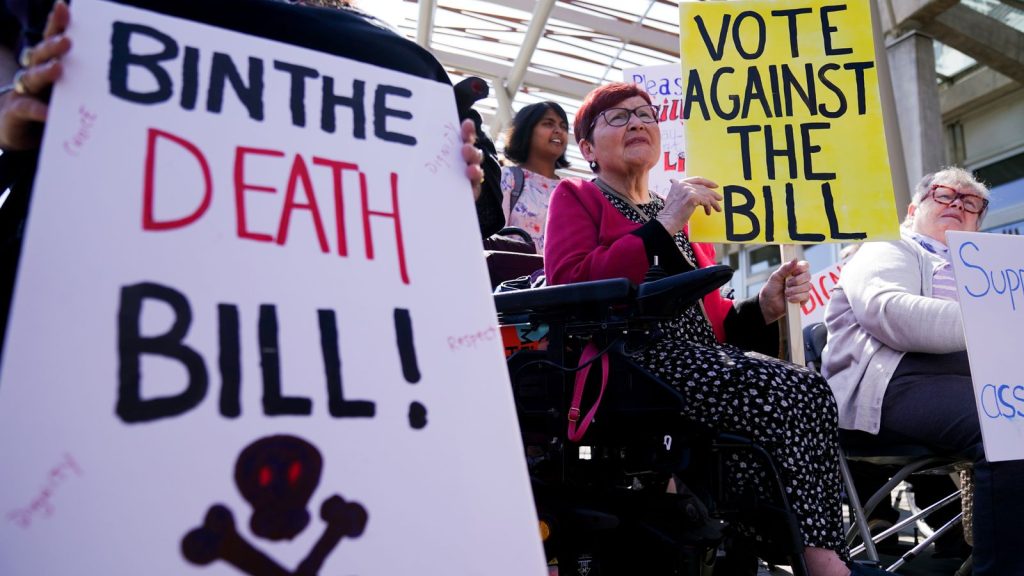More than 1,000 doctors have written to MPs urging them to vote against the assisted dying bill, calling it a “real threat to both patients and the medical workforce”.
The bill – which is due to be voted on by MPs for a final time on 20 June – would allow terminally ill patients from England and Wales to end their lives “on their own terms”, providing they have a life expectancy of six months or less.
A separate bill is currently passing through the Scottish parliament.
But doctors from across the NHS have written to MPs, warning them of their “serious concerns”.
Notable signatories include Sir John Burn, a geneticist who has led decades of cancer research, Sir Shakeel Qureshi, who was knighted for his work in paediatric cardiology, Professor Aileen Keel, the former deputy chief medical officer for Scotland, and Baroness Finlay, a Welsh doctor, professor of palliative medicine and member of the House of Lords.
The letter is signed by four doctors who hold OBEs, two who have MBEs, and one CBE.
The letter says that while a debate is needed on end of life care, “this bill is not the answer”.
It raises concerns that not enough evidence has been heard from doctors, people with disabilities and other marginalised groups.
“This bill will widen inequalities, it provides inadequate safeguards and, in our collective view, is simply not safe,” it goes on to say, calling it a “deeply flawed bill”.
Read more:
Why is assisted dying so controversial – and where is it already legal?
Five stories that bring the assisted dying debate home
Two terminally ill patients give opposing views on assisted dying
Professor Colin Rees, a member of the Royal College of Physicians working group on assisted dying, said it was the “single most important piece of healthcare legislation in 50 or 60 years”.
“It will have very profound consequences for the future and many doctors are really concerned that members of parliament are not hearing the views of the medical profession.”
He said many doctors who remain neutral, or who even support the principle of assisted dying, remain concerned about the bill.
“We don’t think it’s a bill that is safe, that protects patients, protects families, and protects the medical workforce.”
‘No safeguards against coercion’
One of the areas of concern raised by the medics was the inability to properly identify patients at risk of coercive control.
“Vulnerable patients are at risk of coercion with women, victims of domestic abuse, and the elderly at particular risk,” the letter says.
It also warned it would widen social inequalities, with patients who do not have the resources for a comfortable death more likely to opt for assisted dying.
“People who struggle to pay for heating or care or wish to preserve their assets for their children are at high risk of choosing to die if the option is available and the alternative is more difficult.”
Data from the Annual Report of Dying With Dignity from Oregon in 2024 found 9.3% of those people who choose assisted deaths do so for financial reasons.
‘Doctors get it wrong 40% of the time’
Concerns have also been raised around the inaccuracies of medical prognosis.
“Research demonstrates that doctors get prognosis wrong around 40% of the time,” the letter says.
“As such, patients may end up choosing an assisted death and losing what could have been happy and fulfilling months or years of life.”
The bill is also a risk to families, the letter says, as it does not require doctors to speak with family members.
“A close relative may know nothing until they get a call to arrange collection of their relative’s body,” it says, adding that there is no mechanism for a family member to raise concerns about a request.
The letter also addressed the potential impact on the medical workforce.
Evidence from the Netherlands suggests “doctors feel pressurised when dealing with patient requests for assisted deaths, meaning that doctors may end up having involvement despite it being against their principles, because they want to help their patients”.




